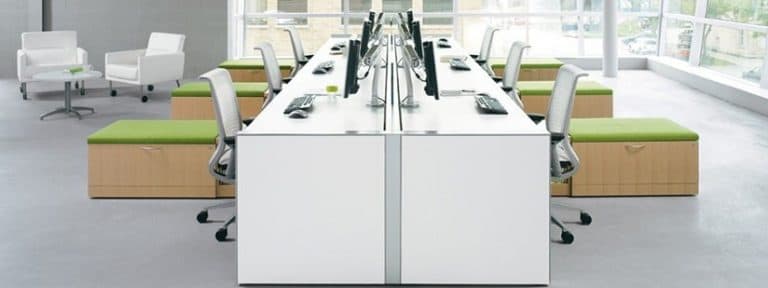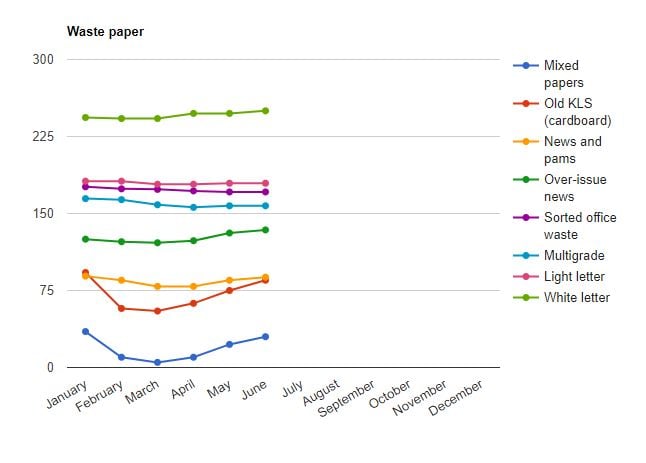
Less than 1 in every 10 office workers recycle in the workplace and their excuse is simply that it falls outside their remit. So, how can you reverse this trend and make your office workforce ambassadors of your Corporate Sustainability goals?
Here are a few ways in which, without much investment, you can work towards a Zero Waste Office Plan.
But first, you need to conduct a full waste audit so you can measure the success of your Zero Waste Plan. How much waste are you currently generating, what type of waste, what are the sources of waste, what is the cost of your waste management collection and don’t forget the sometimes overlooked costs such as cleaning.
The primary objective of this step is to understand the waste stream that your business generates. You might also consider enlisting the services of a waste management company to perform a professional waste audit on your behalf.
A professional waste audit is a detailed analysis of waste generation, management, and disposal of a business during a given period. It involves categorising waste types and sources, as well as collecting, sorting, weighing and recording them. It also includes identifying which items are being recycled and which ones are going to the landfill. Businesses need to develop a thorough understanding of their waste stream to efficiently manage it.
#1 – Improve paper waste segregation.
According to WRAP, the Waste and Resources Action Programme, between 60% and 80% of all office waste is paper. Considering the advancements in technology and mobile connectivity, it’s incredible that so much paper is still used.
The good news is that paper holds a very high value, and a value that sees no signs of reducing any time soon.
Encouraging your workforce to correctly sort and recycle paper, will not only reduce office waste, it will also;
- Increase recycling rates
- Increase the value of your waste
- Support your Corporate Sustainability Goals
Using the letsrecycle.com guide prices, the table below shows indicative prices which may be paid for collection of waste paper material (known as ex-works) by Domestic Mills or by Exporters or Overseas Mills.
 Knowing the value of white paper is 7 times that of mixed paper, there is sufficient support for investment in correct recycling solutions. One might even say there is sufficient support for incentivising your workforce to include recycling within their remit.
Knowing the value of white paper is 7 times that of mixed paper, there is sufficient support for investment in correct recycling solutions. One might even say there is sufficient support for incentivising your workforce to include recycling within their remit.
| Waste Type | Price Per Tonne |
| Mixed Paper | £25- £35 |
| Sorted Paper | £168 – £174 |
| White Paper | £245 – £250 |
#2 – Designate Zero Waste Champions or Ambassadors.
It really doesn’t matter how large or small your business is, if zero waste is a key goal. the addition of a team of dedicated zero waste champions would certainly keep the flag flying.
A team (or even just one person) who dedicates a certain percentage of their time to monitor, motivate and drive the business towards is zero waste goals. One key element to any successful campaign is communication, so your zero waste champions may wish to include the following activities to always keep the goal front of mind:
- Add zero waste as a regular topic at team meetings (each department, from the bottom to the top)
- Promotion of performance against targets, distributed by newsletter, intranet, staff posters etc
- Mentoring – identify key departments or persons that may need just a little nudge in the right direction
- Celebrating success: Even a small win is a win, so keep employees motivated with a little reward. We are aware of one company that awards a Zero Waste Trophy to the best performing team each month, thus creating rivalry
#3 – View Waste As A Resource
.jpg)
- Their waste paper is securely shredded, recycled and turned into paper towels for their office toilet blocks
- Their cooking oil from their London office canteens etc are refined and turned into bio-fuel for tri-generators in their offices
#4 – Donate
As defined by the 3 R’s, if you can’t reduce – reuse or recycle. But don’t be confined to reusing and/or recycling within your business. Think outside of the box and donate.
Pricewaterhouse Coopers excels at this too. They believe, as a best estimate, that 3.5 million pieces of office furniture is discarded each year. Sending furniture to landfill is the old way of doing things. Look closely at furniture and you’ll see the raw material – the wood, the metal, the plastic. If you can’t make use of it, or recycle it, why not donate. This video (right) showcases just a few examples of where donating office waste generates income and outweighs the cost of disposing it to landfill.
We are all guilty of using landfill, however it is time to change the way in which we think about waste.
At Unisan UK, we provide game-changing solutions that enable our customers to rethink their traditional approaches & demonstrate their commitment to environmental sustainability, whilst making recycling easier and more efficient.
Keen to learn more?
